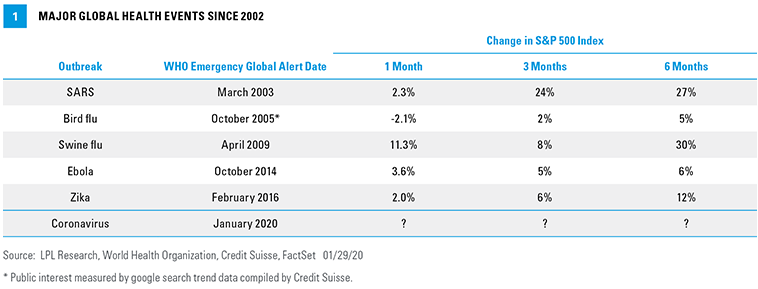Given the recent volatility in the markets, we want to provide you with our most recent thoughts on headlines pertaining to the coronavirus and its effect on the markets. A Brief History
In late January, when news of the epidemic initially started to break, the stock market experienced several big drops. However, it bounced back pretty quickly, and on 2/12/2020 the Dow Jones Industrial Average closed at all time high of 29,551.
In the last week, concerns about the economic impact of the disease have resurfaced. Even as China has appeared to get the disease under control, rapidly expanding outbreaks in other countries such as South Korea and Italy, are leading to fears of a more widespread problem.
As a result, the market has sold off, culminating in the Dow plunging more than 1,900 points in the last two days to close at 27,081 on 2/25. That's a drop of more than 8% from its high less than two weeks ago.
Being Prepared For nearly eleven years now, we've had remarkably strong performance from the stock market. However, because the market is cyclical, we know that what goes up must come down. That is why we have been consistently communicating the value of being prepared for a market downturn, including a tool we’ve developed called the Recession Prep Scorecard®. Click here to read more about that. The Problem with Predictions We believe in the value of staying informed of various opinions and perspectives on the economy, however, we also know the limitations of trying to predict what will happen. This is especially true when it comes to investing. What triggers a major market selloff is very often some completely unforeseen event. Over the last couple years, we've listened to countless economists and portfolio managers give their market outlooks. Though many of them were concerned about China's effect on our economy, not one of them had the coronavirus in mind. Major Event or Temporary Panic? It is still unclear as to how big of an economic impact the coronavirus will have. Following his annual shareholder meeting over this past weekend, Warren Buffett said the coronavirus is “scary stuff” for businesses and investors, but the outbreak has not changed his long term outlook on stocks which is still optimistic. Billionaire hedge fund manager David Tepper said investors should be cautious until we know more about it. Although he was bullish just last month, he said, "You have to be careful, because it may be a game changer." On the other hand, it is reasonable to believe that fears are overblown if you consider that past contagious disease breakouts have been contained and the market has rebounded well. Over a 38-day trading period during the height of the SARS virus back in 2003, the S&P 500 index fell by nearly 13%. During the Zika virus, which occurred at the end of 2015 and into 2016 the market fell again by just under 13%. There are other examples in which the market ultimately recovered and hit new highs. The extent of the economic impact may depend on how individual consumers respond. Repeated messaging in the media about the deadliness of this new virus can increase fear, but these fears often subside after a short period of time. Concluding Thoughts We still believe it is too soon to tell whether the market is revealing the start of a much bigger decline or whether this is a buying opportunity. There remain too many unknowns to really gauge the extent of the economic damage it could cause. We'll continue to watch the current situation and look for opportunities to buy equities. It is exactly for times like these that we have developed our Recession Prep Scorecard™ and the Retirement Shock Absorber® to help insulate your financial security from unforeseen events. We can't predict the future, but we can prepare for it. >> To learn more, just go to brownandco.com/preparation Content in this material is for general information only and not intended to provide specific advice or recommendations for any individual. All performance referenced is historical and is no guarantee of future results. All indices are unmanaged and may not be invested into directly.